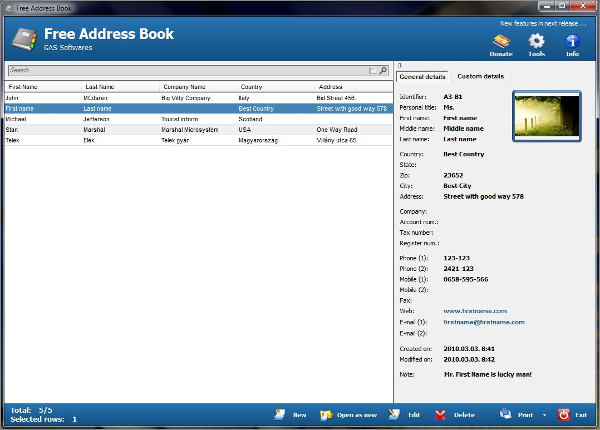Simple yet packed with features
Exporter for Contacts (formerly 'Export Address Book') is a popular Mac app to export Mac Address Book contacts to CSV, Excel, and various other formats, capable of organizing export setups into reusable templates to make repeated exports a lot easier. Compared to similar apps, Exporter for Contacts offers the highest level of flexibility for exporting contacts data from iCloud and other sources.

The app lets you export selected contacts, groups and whole address books from Apple’s Contacts app and lets you decide which contact details should be exported. It's very easy to use but highly flexible and configurable and works well with all macOS versions from Mac OS X 10.9 to macOS 11 Big Sur. The long list of supported export formats includes:
FullContact is an efficient address book application for Mac users. The application has some amazing features which make it stand apart from the rest. The application shows a complete view of the contacts and users can also view the social profiles as well as the job titles and locations of the contacts. Address Book with 432 Entry Spaces, Pocket & Change of Address Labels. Attractive Small Address Book - Perfect for All Your Contacts! 4.6 out of 5 stars 10. Parrots $12.99 $ 12. FREE Shipping on orders over $25 shipped by Amazon. In stock on January 17, 2021.
- Excel Workbook (native Excel XLSX format)
- CSV and tab-delimited text
- Outlook for Windows (2003 and 2010 formats)
- Google Gmail Contacts CSV
- Fritz!Box/Fritz!OS Adressbuch
- Customizable vCards
- For experts: XML with optional XSL 1.0 Transformation
- HTML-Table
AdressBookSourceSync process consumes vast majority of Mac's resources and keeps showing randomly popping up log in windows, how to fix?
You may have noticed that your computer performance decreased on a number of occasions. You may also have attempted to close some frozen applications via Activity Monitor and noticed that the Mac is sluggish due to the AddressBookSourceSync process that is consuming up to 100% of CPU resources and 2-4 GB RAM. Additionally, some users report this significant and frustrating issue when upgrading their operating systems or simply changing the user account login password.
Extensive consumption of Mac resources is not the only symptom. In addition, many people experience random pop-up windows that ask users to enter Keychain access passwords. Furthermore, up to 3-4 windows must be closed, all of which have the same request. Other reports suggest that entering the password once closes all windows, however, this is often temporary and the situation can repeat several times per day. These symptoms are very distracting for users requiring maximum concentration on their work. Fortunately, the solution is simple and quick to apply. In this article, we describe a step-by-step method to stop the AddressBookSourceSync process consuming Mac resources and prevent random pop-up password request windows.
Table of Contents:
Cpu Manager Pc
It is recommended to run a free scan with Malwarebytes - a tool to detect malware and fix computer errors. You will need to purchase the full version to remove infections and eliminate computer errors. Free trial available.
Fix AddressBook resource consumption issue
Start by ensuring that the MobileMe feature is not syncing data. If your Mac still contains this feature, go to System Preferences by clicking the Apple logo in the menu bar at top of the screen and select System Preferences. In the new window, locate the search field in the top right corner of the window and type MobileMe. When you find the application, log out from it. Do not worry about functionality loss, because this service is no longer active.
Next, backup your Contacts, otherwise you might lose some/all them during this method. To backup, launch the Contacts application by opening Finder and going to the Applications folder, or by using Spotlight, simply press the keyboard shortcut of Command and Spacebar, and then type Contacts. Once the app launches, click on File in the menu bar at top of your screen and choose the Export option. Select the Contacts Archive option and choose the location within your computer where you wish to save file with all contacts. Set the name of file and click the Save button.
Once you have saved your contacts within the computer, go to the iCloud website and check if all of your contacts remain. When you have backed-up all contacts, open Activity Monitor by using Spotlight or opening Finder, going to the Application folder, and then opening Utilities. Launch the app. In the monitor window, locate the search field in the bottom right corner and type AddressBookSourceSync to ensure this process is not running, otherwise select the process and click the Quit (x) icon in the top left corner of the window, and choose quit from the pop-up window.
Next, visit the user library folder of your Mac. Open Finder and click on Go in the menu bar at top of the screen, select Go to folder, type the follow path, and click Go.
- ~/Library/Application Support/AddressBook/
Alternatively, choose to enter the destination manually, hold down the Option key while clicking on Go and you will see the Library option within the drop-down list.
When you have entered the Address Book folder, remove all files within, except files with the extension '.plist'. After clearing the folder, go to Mac System Preferences and choose the iCloud pane. Locate the Contacts option and disable the checkbox next to it. Wait several seconds and enable the checkbox to relaunch the syncing process.
You can reopen the Activity Monitor to check the status of the syncing process. After a few moments, the AdressBookSourceSync process activity should decrease and consumption of Mac resources should reduce.